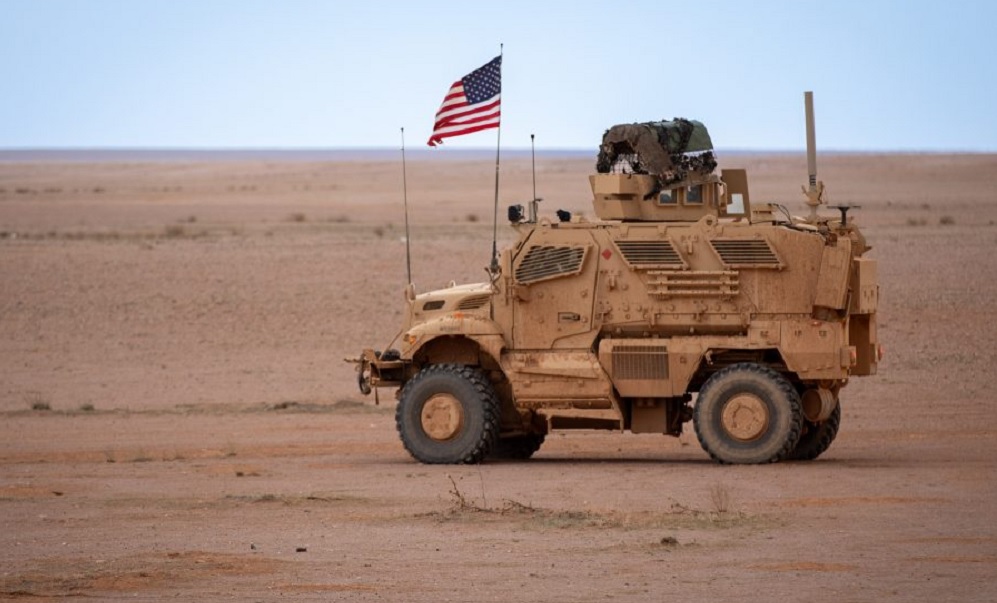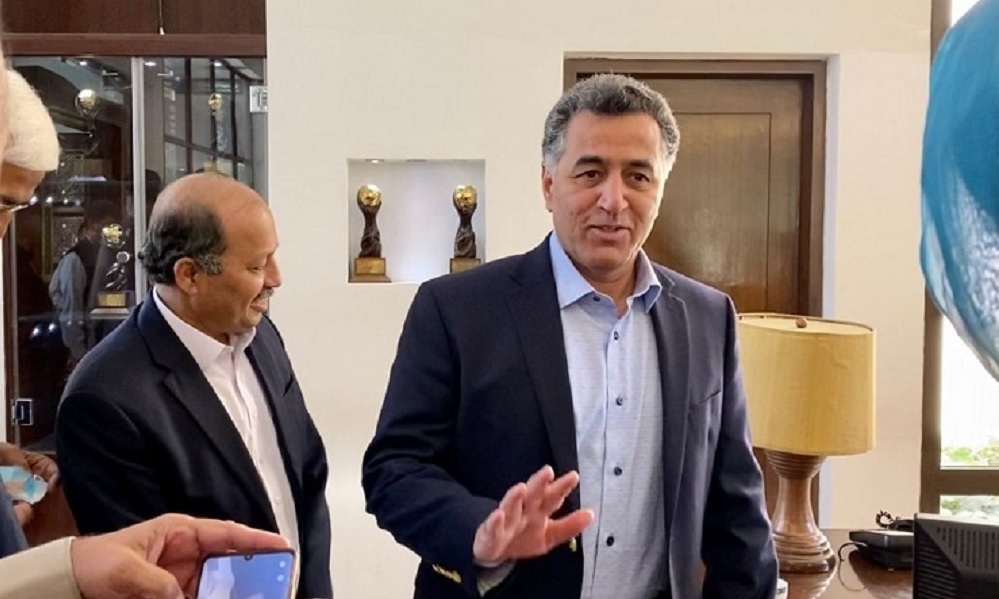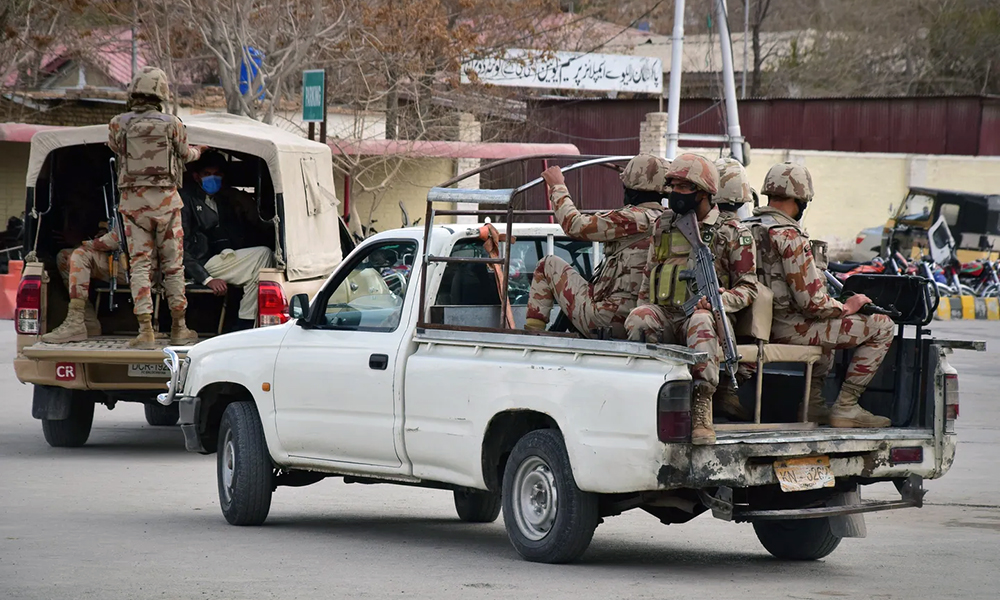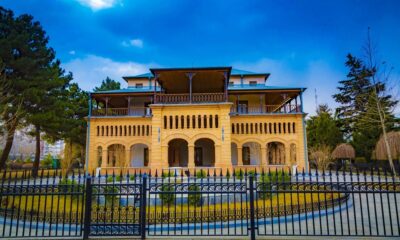Regional
Imran Khan: It would be ‘foolish’ not to have good relations with army
The political instability since Khan’s ouster from power helped force Islamabad to accept the IMF’s painful fiscal consolidation requirements, which have burdened the people with heavy taxes, analysts say.

Pakistan’s jailed former prime minister, Imran Khan, who blames the military for his ouster and 12-month-old imprisonment on what he calls trumped-up charges, said on Sunday it would be “foolish” not to have “excellent” relations with the army.
Ahead of Monday’s anniversary of his jailing on dozens of charges ranging from corruption to leaking state secrets, Khan also said in written responses to Reuters questions that he held no grudges against the United States, whom he has also blamed for his 2022 ouster from office.
“Given Pakistan’s geographical position and the military’s significant role in the private sector, it would be foolish not to foster such a relationship,” Khan wrote in replies relayed by his media and legal team.
“We are proud of our soldiers and armed forces,” he said.
Khan said his criticisms since his ouster had been directed at individuals, not the military as an institution. “The miscalculations of the military leadership shouldn’t be held against the institution as a whole.”
On Wednesday, Khan offered to hold “conditional negotiations” with the South Asian nation’s military – if “clean and transparent” elections were held and the “bogus” cases against his supporters were dropped.
Pakistan’s army and government did not immediately respond to requests for comment on Khan’s remarks to Reuters. They have both repeatedly denied his assertions.
The United States denies any role in his ouster.
In his replies, the 71-year-old former cricket star did not specify what he wanted to discuss with the military.
The army, which has ruled Pakistan for more than half its 76-year independent history, plays an oversized role in the politics and governance of the nation of 240 million people.
No Pakistani prime minister has completed a full five-year term in office, and most have served time in jail. Analysts say most of those secured their release after striking deals with the military, a claim the army denies.
Khan, who lost power in a parliamentary vote of no confidence after falling out with the generals, has said the army has been backing what he calls the politically motivated cases against him, which the military has denied.
Still, he said, there would be “no harm” in engaging with the generals if he should be released from jail and seek to return to power.
“We are open to any dialogue that could help improve the dire situation in Pakistan,” he said, adding that it was useless to open any such talks with the coalition government of Prime Minister Shehbaz Sharif, which he says does not enjoy public backing because he claims it won a stolen election in February.
Rather, Khan said, it would be “more productive to engage with those who actually wield power”.
The military – which says Khan and his party were behind attacks on military installations last year during widespread protests against his detention – has previously ruled out any talks with him.
Khan’s imprisonment has added to the political volatility in Pakistan, which has experienced a prolonged economic crisis and last month received a bailout from the International Monetary Fund.
The political instability since Khan’s ouster from power helped force Islamabad to accept the IMF’s painful fiscal consolidation requirements, which have burdened the people with heavy taxes, analysts say.
The IMF has called for political stability to help put the $350 billion economy on a recovery path.
Khan rejected the idea of reaching an out-of-court settlement with the government or military, unless they accepted that his PTI party had won a majority in February’s election.
“The elections were the most rigged in Pakistan’s history,” Khan told Reuters.
Regional
Two US soldiers and an interpreter killed in suspected Daesh attack in Syria

Two U.S. Army soldiers and a civilian interpreter were killed in Syria on Saturday by a suspected Daesh attacker who targeted a convoy of American and Syrian forces before being shot dead, the U.S. military said.
The attack was barely a month after Syria announced it had signed a political cooperation agreement with the U.S.-led coalition against Daesh, which coincided with Syrian President Ahmed al-Sharaa’s visit to the White House, Reuters reported.
The attacker was a member of the Syrian security forces, three local officials told Reuters. A Syrian Interior Ministry spokesperson told a state-run television channel that the man did not have a leadership role in the security forces.
“On December 10, an evaluation was issued indicating that this attacker might hold extremist ideas, and a decision regarding him was due to be issued tomorrow, on Sunday,” the spokesperson, Noureddine el-Baba, told Syrian television channel Al-Ikhbariya.
In a post on his Truth Social platform, U.S. President Donald Trump vowed “very serious retaliation,” mourning the loss of “three great patriots”. He described the incident in remarks to reporters as a “terrible” attack.
CENTRAL COMMAND SAYS THE ATTACKER WAS KILLED
Three U.S. soldiers were also wounded in the attack, the U.S. military’s Central Command said.
In a statement, Central Command said the attack by a lone gunman occurred “as the soldiers were conducting a key leader engagement” in the central Syrian town of Palmyra. “Partner forces” killed the attacker, U.S. Secretary of Defense Pete Hegseth wrote in a social media post.
A senior U.S. official said initial assessments indicated that Daesh probably carried out the attack, although the militant group did not immediately claim responsibility.
It took place in an area not controlled by the Syrian government, the official said.
Baba said Syria had warned about the possibility of an Daesh attack in that region but that “coalition forces did not take the Syrian warnings… into account.”
He said Syria would determine whether the attacker was linked to Daesh or merely subscribed to the group’s ideology.
The soldiers’ names will be withheld until 24 hours after the next-of-kin notification, the U.S. military said.
US ENVOY CONDEMNS THE ATTACK
Syrian state news agency SANA quoted a security source as saying two Syrian service personnel were injured, without providing further details. The source told SANA that American helicopters evacuated the injured to a U.S. base in Syria’s Al-Tanf region near the Iraqi border.
Tom Barrack, the U.S. ambassador to Turkey and special envoy to Syria, condemned the attack.
“We mourn the loss of three brave U.S. service members and civilian personnel and wish a speedy recovery to the Syrian troops wounded in the attack,” Barrack said in a statement. “We remain committed to defeating terrorism with our Syrian partners.”
The U.S.-led coalition has carried out air strikes and ground operations in Syria targeting Islamic State suspects in recent months, often with the involvement of Syria’s security forces. Syria last month also carried out a nationwide campaign arresting more than 70 people accused of links to the group.
The United States has troops stationed in northeastern Syria as part of a decade-long effort to help a Kurdish-led force there.
Regional
Pakistan’s ex-spy chief jailed for 14 years in rare military rebuke

A military court in Pakistan jailed former spy chief Faiz Hamid for 14 years on four charges including interference in politics, the army said on Thursday, in a rare conviction of a once-powerful general in the South Asian nation.
Hamid, in custody and under trial since August last year, was the chief of Pakistan’s powerful Inter-Services Intelligence agency from 2019 to 2021 under jailed former Prime Minister Imran Khan, and the two were considered close allies.”The accused was tried on four charges,” the military said in a statement, Reuters reported.
The charges ranged from engaging in political activities and violating the Official Secrets Act in a way detrimental to safety and state interest to misuse of authority and resources as well as causing wrongful loss to individuals, it added.
TIES TO JAILED FORMER PM IMRAN KHAN
The former general was found guilty on all the charges, the military said, without detailing the incidents. His conviction followed “lengthy and laborious legal proceedings”, it added, and Hamid has a right of appeal.
He also faces a separate investigation of his role in May 2023 attacks by thousands of Khan’s supporters on scores of military installations and offices to protest against the arrest of the 72-year-old former cricket star.
Information Minister Attaullah Tarar said Hamid had crossed “red lines” and acted as an advisor to Khan’s party to try to create chaos in the country.
Hamid’s lawyers or family could not be reached for comment. Khan’s PTI party did not immediately respond to a Reuters request for comment.
Khan has been in jail since August 2023.
Khan and nearly 150 of his party leaders and supporters have already been indicted by an anti-terrorism court on charges of inciting the attacks that also targeted military headquarters in the garrison city of Rawalpindi.
Khan and his associates deny the charges.
Hamid’s close ties to Khan, who blames the military for ousting him from power in 2022, were a source of tension between the cricketer-turned-politician and the military.
The military, which has directly ruled the nation of 241 million for more than three decades of its 77-year independent history, plays a big role in making or breaking governments.
Regional
Six Pakistani soldiers killed in TTP attack in Kurram District
Islamabad has accused TTP fighters of using Afghan territory to stage attacks inside Pakistan, a claim Kabul denies, insisting that Pakistan’s security problems are internal matters.

Six Pakistani soldiers were killed and four others injured when militants attacked a security checkpoint in northwest Pakistan’s Kurram district, officials confirmed on Tuesday. The Tehreek-e-Taliban Pakistan (TTP) claimed responsibility for the assault.
The attack took place in the Manato area late Monday afternoon, according to a police officer at the district’s emergency control room. A government official, speaking on condition of anonymity, told AFP that two militants were also killed during the exchange of fire.
Security forces later identified one of the dead militants as local TTP commander Usman Khyberi.
The incident comes amid heightened tensions between Pakistan and Afghanistan, as both sides struggle to maintain a fragile calm following deadly border clashes in October—the worst since the Islamic Emirate took control of Kabul in 2021.
Sporadic skirmishes have continued, including heavy exchanges of fire last week that left at least five people dead.
Islamabad has accused TTP fighters of using Afghan territory to stage attacks inside Pakistan, a claim Kabul denies, insisting that Pakistan’s security problems are internal matters.
Efforts to broker a lasting truce have so far failed. Three rounds of peace talks—facilitated by Qatar, Türkiye, and Saudi Arabia—have not produced a breakthrough.
-

 Latest News3 days ago
Latest News3 days agoIslamic Emirate declines to attend Tehran meeting on Afghanistan
-

 Latest News2 days ago
Latest News2 days agoUS delivers second batch of Afghan Black Hawk helicopters to Peru
-

 Latest News5 days ago
Latest News5 days agoMuttaqi: Afghanistan’s progress requires both religious and modern education
-

 Latest News4 days ago
Latest News4 days agoDual-citizen Afghans don’t need a visa to enter the country: Foreign Ministry
-

 Sport5 days ago
Sport5 days agoVictories for Sorkh Poshan Khafi and Abu Muslim Farah in Afghanistan Champions League
-

 Business2 days ago
Business2 days agoAfghan economy posts second year of growth despite deep structural challenges
-

 Latest News4 days ago
Latest News4 days agoPakistan PM: We need the international community to urge the IEA to curb terrorism
-

 International Sports2 days ago
International Sports2 days agoILT20: Jahangir powers Dubai Capitals to nine-run win over Abu Dhabi Knight Riders

























